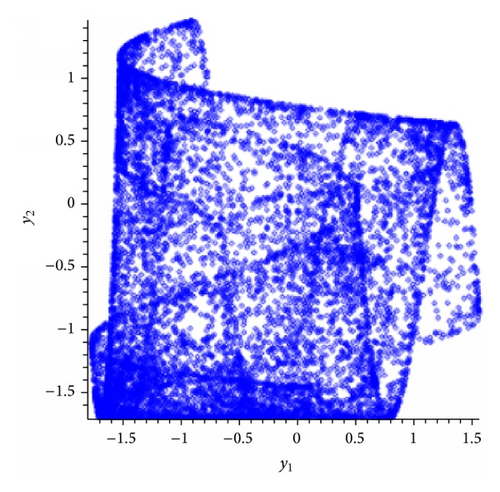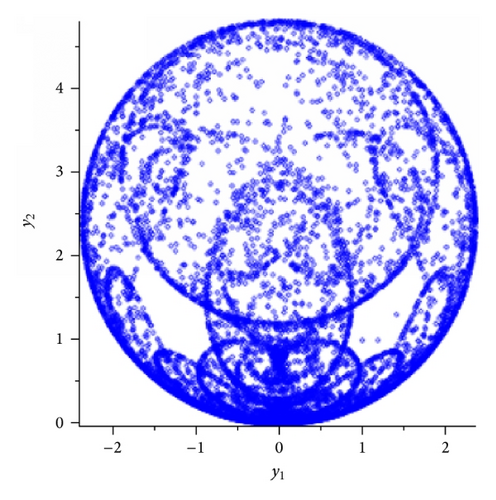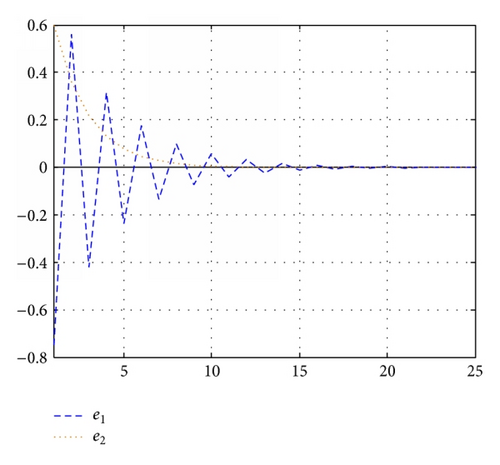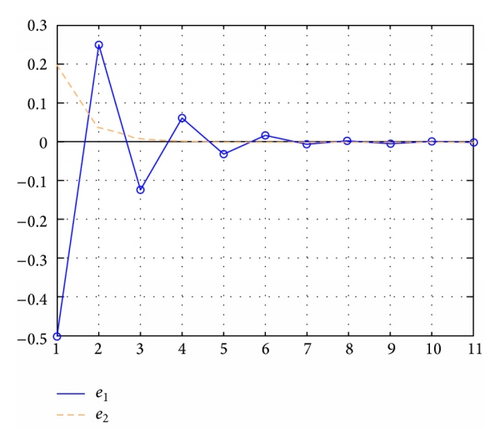On Full-State Hybrid Projective Synchronization of General Discrete Chaotic Systems
Abstract
The problems of full-state hybrid projective synchronization (FSHPS) and inverse full-state hybrid projective synchronization (IFSHPS) for general discrete chaotic systems are investigated in 2D. Based on nonlinear control method and Lyapunov stability theory, new controllers are designed to study FSHPS and IFSHPS, respectively, for 2D arbitrary chaotic systems in discrete-time. Numerical example and simulations are used to validate the main results of this paper.
1. Introduction
Many mathematical models of biological processes, physical processes, and chemical processes, etc., were de…ned using chaotic dynamical systems in discrete-time. Recently, more and more attention were paid to chaos synchronization in discrete-time dynamical systems [1–3]. Synchronization of discrete chaotic dynamical systems has also potential applications in secure communication [4, 5]. Since the work of Pecora and Carroll [6], various powerful methods and techniques have been proposed to investigate chaos synchronization in dynamical systems [7, 8] and different types of synchronization have been reported [9–11].
Recently, a novel type of synchronization, known as full-state hybrid projective synchronization (FSHPS), has been introduced and applied to chaotic systems in continuous-time [12], which includes projective synchronization (PS) and hybrid projective synchronization (HPS). In FSHPS, each response system state synchronizes with a linear combination of drive system states. By the same procedure we can define a new type of synchronization, called inverse full-state hybrid projective synchronization (IFSHPS), when each drive system state synchronizes with a linear combination of response system states.
In this paper, based on nonlinear control method in 2D and discrete-time Lyapunov stability theory, firstly, a new synchronization controller is designed for full-state hybrid projective synchronization (FSHPS) of general chaotic systems. Secondly, a new control scheme is proposed to study the problem of inverse full-state hybrid projective synchronization (IFSHPS) for arbitrary chaotic systems. The synchronization criterions derived in this paper are established in the form of simple algebraic conditions about the linear part of the response system and the drive system, respectively, which are very convenient to verify. In order to show the effectiveness of the proposed synchronization schemes, our approach is applied to the drive Fold discrete-time system and the controlled Lorenz discrete-time system to achieve FSHPS and IFSHPS, respectively.
The remainder of this paper is organized as follows. In Section 2, definitions of FSHPS and IFSHPS are introduced. In Section 3, a new controller is designed to study FSHPS. In Section 4, a new synchronization criterion for IFSHPS is derived. In Section 5, numerical application and simulations are given to show the use of the proposed control schemes and the derived synchronization criterions. Finally, conclusion is followed in Section 6.
2. Definitions of FSHPS and IFSHPS
We present the definition of full-state hybrid projective synchronization (FSHPS) for the drive-response chaotic systems (1).
Definition 1. The coupled drive-response chaotic systems (1) are in full-state hybrid projective synchronization (FSHPS) when, for an initial condition, there exist controllers ui, (1 ≤ i ≤ n), and given real constants such that the synchronization errors
The definition of inverse full-state hybrid projective synchronization (IFSHPS) is given next.
Definition 2. The coupled drive-response chaotic systems (1) are in inverse full-state hybrid projective synchronization (IFSHPS) when, for an initial condition, there exist controllers and given real constant such that the synchronization errors
3. Controller Design for FSHPS in 2D
Theorem 3. If the control constants are chosen such that
Proof. By substituting the control law (10) into (7), the synchronization errors can be written as
4. New Criterion for IFSHPS in 2D
Theorem 4. If the control constants are chosen such that
Proof. By substituting control law (22) into (18), the synchronization errors can be written as
5. Numerical Application and Simulations


5.1. FSHPS between the Discrete-Time Fold System and the Controlled Lorenz Discrete-Time System
Corollary 5. The drive Fold discrete-time system and the response Lorenz discrete-time system are globally full-state hybrid projective synchronized, if the control constants are chosen such that
If we take (l1, l2) = (2,0.5) and by using Matlab, we get the numeric result that is shown in Figure 3.

5.2. Inverse FSHPS between the Discrete-Time Fold System and the Controlled Lorenz Discrete-Time System
Corollary 6. The drive Fold discrete-time system and the response Lorenz discrete-time system are globally inverse full-state hybrid projective synchronized, if the control constants are chosen such that
Finally, if we take (l1, l2) = (0.5,1) and by using Matlab, we get the numeric result that is shown in Figure 4.

6. Conclusion
In this paper, to study FSHPS and IFSHPS between arbitrary chaotic dynamical systems in 2D discrete-time, a new nonlinear control method was presented. It was shown that the proposed synchronization criterions were based on simple and effective results. Firstly, FSHPS is achieved by controlling the linear part of the response system. Secondly, IFSHPS is guaranteed when the linear part of the drive system is controlled. Finally, numerical example and simulations results were utilized to illustrate the effectiveness of the proposed schemes.
Conflict of Interests
The authors declare that there is no conflict of interests regarding the publication of this paper.




